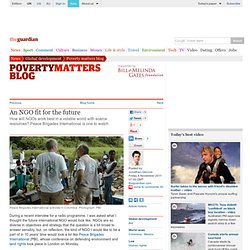

David Damberger: What happens when an NGO admits failure. The charity disparity: can corporate benevolence be free of self-interest? For all the talk of aid dependency, Haiti is more dependent on remittances – people sending money home from abroad – than donations.

While aid averaged about 12% of its annual income between 2004 and 2009, remittances from workers abroad averaged more than 22%, officially reaching almost $1.5bn in 2010 (although experts claim it is at least double that). As one friend put it, the Haitian toiling in the cloakroom of some London nightclub is more important than the World Bank. An NGO fit for the future. Peace Brigades International activists in Colombia.

Photograph: PBI During a recent interview for a radio programme, I was asked what I thought the future international NGO would look like. NGOs are so diverse in objectives and strategy that the question is a bit broad to answer sensibly, but, on reflection, the kind of NGO I would like to be a part of in 10 years' time would look a lot like Peace Brigades International (PBI), whose conference on defending environment and land rights took place in London on Monday.
Most people might think of international NGOs as essentially conduits to pass money from rich people in the north to poor people in the south. After all, the marketing campaigns usually feature poor people looking cash-strapped, and the simple act of putting a coin in a collecting tin, or setting up a direct debit when inadvertently "chugged" (charity-mugged) on the street, implies that the important part of the equation is the money.
NGO hopes to benefit from failure. NGOs battle for media attention, devoting considerable effort and energy into getting that crucial eyeball contact. Usually that means making the message as stark and sensationalist as possible, with the implicit message that the NGO knows exactly how to sort out the problem – whether that is tax havens, Aids or educating 10-year-olds in Tanzania. So I'm full of admiration for a Canadian NGO that is breaking all the rules by publishing a failure report. Engineers Without Borders has bravely catalogued various mistakes in its projects. Project officers come clean in a series of snapshots of what they did wrong .